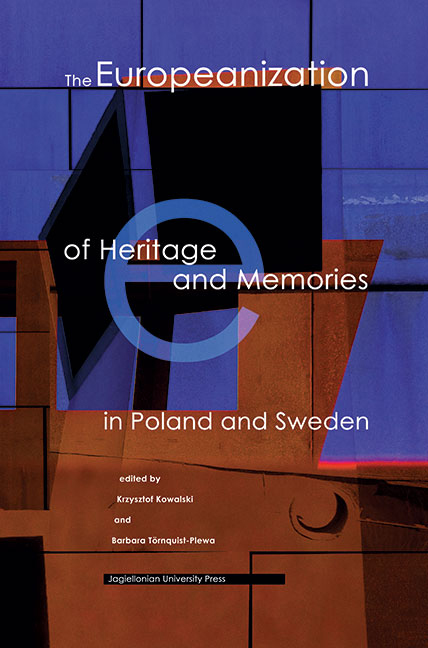Book contents
- Frontmatter
- Contents
- Acknowledgements
- Preface
- PART I European Heritage in the Making
- Heritage and Memory in a Changing Europe. Introductory Remarks
- Democratization as an Aspect of Heritage Europeanization. The Museum Triangle
- “A Dangerous Country.” The Council of Europe in Search of a Common Heritage
- Eurovikings. European Heritage Discourses and Transnational Practices in a Viking Site
- Euro-ethics. European Solidarity Centre in Gdańsk and the Narrative on the Polish Road to Freedom
- PART II Redefining the Dramatic Past
- Conclusion
- Notes on Contributors
“A Dangerous Country.” The Council of Europe in Search of a Common Heritage
from PART I - European Heritage in the Making
Published online by Cambridge University Press: 22 December 2017
- Frontmatter
- Contents
- Acknowledgements
- Preface
- PART I European Heritage in the Making
- Heritage and Memory in a Changing Europe. Introductory Remarks
- Democratization as an Aspect of Heritage Europeanization. The Museum Triangle
- “A Dangerous Country.” The Council of Europe in Search of a Common Heritage
- Eurovikings. European Heritage Discourses and Transnational Practices in a Viking Site
- Euro-ethics. European Solidarity Centre in Gdańsk and the Narrative on the Polish Road to Freedom
- PART II Redefining the Dramatic Past
- Conclusion
- Notes on Contributors
Summary
It is the task of history to change the people.
Togetherness, diversity, tolerance, freedom, (comm)unity are all words that in some instance go together. I am particularly referring to a European political context and to organizations like the European Union (EU) and the Council of Europe (CoE), that is, political institutions that struggle with such words and how to transform them into realities.
It is well known that culture and heritage has been given increasing importance in the drive to attain a society characterized by such words and values. In 2015, when this investigation was conducted, it appeared that we were struggling more than ever to promote them in our everyday practices, as well as in political and other public discourses. Tremendous streams of refugees, poverty in combination with general expressions of xenophobia, antisemitism and antiziganism seemed to challenge such an objective on a daily basis.
It is, however, quite obvious that heritage and culture could be used for a number of political purposes. To preserve and promote heritage is not a neutral action but, on the contrary, it is used for many different objectives, not least the political.
This chapter will investigate one European heritage campaign focused on heritage as a means of creating community and tolerance out of diversity. The campaign in question was “Europe, a Common Heritage,” organized by the Council of Europe 1999 to 2000. The reason for this choice is that the heritage concept in this campaign was so obviously related to both political goals and a European context where community and tolerance were intensively discussed. The connection between politics and heritage was not unique and, the contrary, in the 1990s the heritage concept developed strongly. In a current project on the use of the concept of heritage in Sweden in the 1990s and the early 21st century, my research group and I have focused on heritage as a category that was been open to different phenomena, uses, practises and meanings during these years. In Sweden, as well as in many other European countries, the heritage concept was (re)vitalised, challenged and established as the most significant word for activities at not only museums, archives and built historical environments but also institutionalised collective memories and past culture in general. During these years the heritage concept became indispensable when referring to activities in and about such institutions.
- Type
- Chapter
- Information
- Publisher: Jagiellonian University PressPrint publication year: 2016



